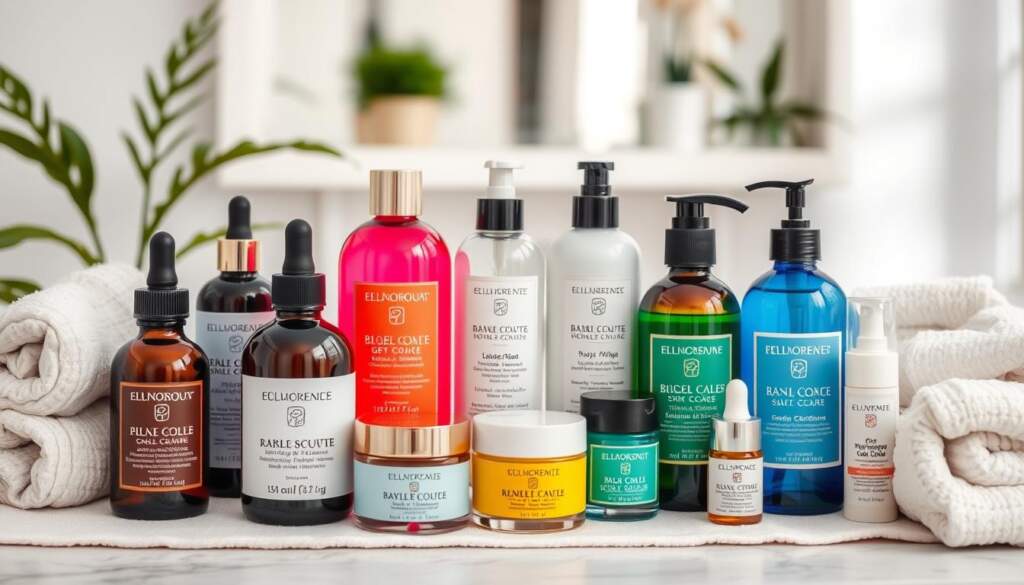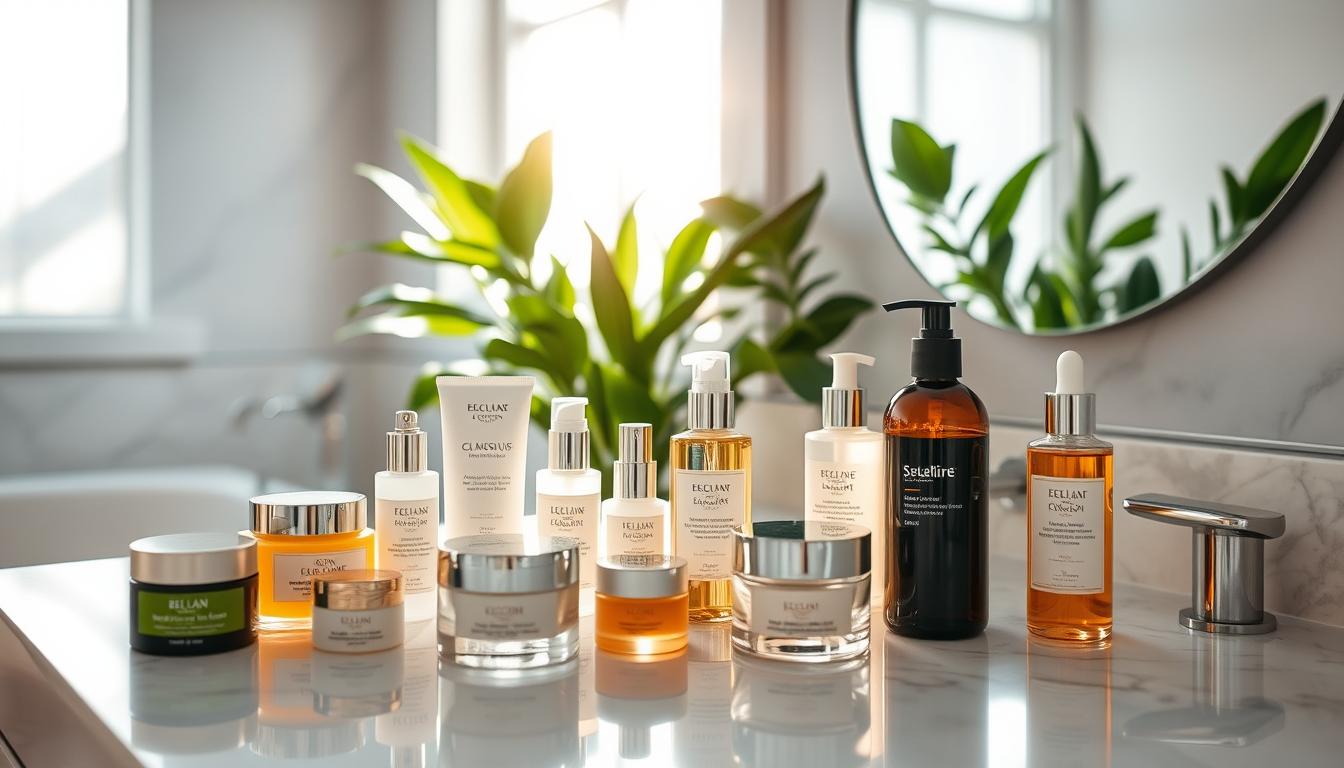Finding the key to radiant skin lies in curating a personalized skincare routine that caters exactly to your unique skin type. Navigating the vast array of skincare options becomes less daunting when you understand your skin’s specific needs and reactions. The process of achieving that perfect skincare blend involves a deep dive into the variables that define your complexion: be it oily, dry, sensitive, combination, or normal. To not just look, but also feel truly luminous, aligning your regimen with the right products is not just beneficial, it’s essential12.
Begin your journey to perfect skincare with an introspective look at your skin’s behavior. This crucial first step ensures the regimen you select will maintain and enhance your magnificent glow2. Reprogramming your daily skincare to mirror your individual needs can alleviate common skin concerns, such as fine lines or persistent acne1, while applying skincare commandments that include cleansing, hydrating, protecting, and treating1. To dive deeper into establishing your personalized skincare routine, join our illuminating discussion on effective skincare by following this insightful newsletter.
Key Takeaways
- Tailoring your skincare routine to your skin type is fundamental for a glowing complexion.
- Identify your skin type to select suitable products for enhanced effectiveness.
- Direction from a dermatologist can amplify the benefits of your skincare choices.
- Familiarize yourself with key ingredients, like hyaluronic acid, for optimal hydration.
- Use broad-spectrum sun protection daily, regardless of your skin type1.
- Consider the Core Four products: cleanser, exfoliant, moisturizer, and SPF specific to your skin needs2.
Understanding Skin Types and Their Needs
The foundation of effective skincare is recognizing the unique attributes and needs of different skin types. Each skin type has its particular set of characteristics and care strategies to maintain its health and appearance.
Skin type characteristics play a crucial role in defining the right skincare routine. Dry skin may feel tight, rough, and flaky due to its low sebum production. This skin type benefits from products that deliver intense hydration and help to lock in moisture3. Conversely, oily skin is characterized by an excess of sebum, leading to a shiny appearance and a predisposition to acne and visible pores4. Products designed for oily skin typically aim to regulate sebum production and maintain clear pores.
Combination skin features a mix of dry and oily patches, which can complicate skincare as the needs differ across the face. It is often oily in the T-zone and dry on the cheeks, requiring a versatile approach in skincare to balance these areas effectively34. Sensitive skin, meanwhile, demands a gentle touch due to its tendency to react adversely to harsh products and environmental factors, necessitating products formulated to be hypoallergenic and soothing5.
Normal skin is the most adaptable and undemanding of the skin types. It is characterized by a well-balanced oil and moisture content, making it neither too oily nor too dry5. People with normal skin should focus on maintaining this balance with a consistent, straightforward skincare regimen to keep the skin healthy.
| Skin Type | Main Characteristics | Recommended Routine Element |
|---|---|---|
| Dry Skin | Low sebum production, feels tight and flaky | Rich, hydrating products |
| Oily Skin | High sebum production, shiny, prone to acne | Sebum regulating products |
| Combination Skin | Mixed sebum levels, oily T-zone, dry cheeks | Balance-focused products |
| Sensitive Skin | Reacts easily, requires gentle care | Non-irritating, hypoallergenic products |
| Normal Skin | Well-balanced, not sensitive | Consistent, gentle products |
Understanding these skin type characteristics is crucial for choosing products that enhance skin health without causing disruption. By tailoring skincare routines to address the specific needs of dry skin, oily skin, normal skin, combination skin, or sensitive skin, individuals can achieve a clearer, healthier complexion5.
How to Determine Your Skin Type Accurately
Identifying your skin type is essential for crafting an effective skincare routine that respects your skin’s natural balance and addresses its unique needs. Two popular methods, the skin type test and the “watch and wait” method, offer straightforward approaches to discovering whether you have oily, dry, combination, or normal skin.
The “watch and wait” method is particularly insightful. Start by gently cleansing your face to remove any makeup or impurities, then pat your skin dry. After waiting for about 30 minutes, observe how your skin feels and looks. Does your face appear shiny, particularly on the forehead, nose, and chin, or feel particularly tight? These observations can reveal much about your skin’s natural tendencies. According to dermatologist Melanie Palm, MD, if your T-zone remains shiny while the rest of your face is matte, it suggests combination skin6.
Additionally, using a blotting sheet can yield quick insights into your skin’s oil production. Press the sheet against different areas of your face, and examine the level of oil absorbed. This blotting sheet method helps to visually quantify the oiliness of different facial areas, which is invaluable for determining if you have oily, dry, or combination skin.
For individuals with oily skin, excessive sebum production might lead to a shiny complexion and a greasy feel, commonly in the T-zone. It’s noted that stress, humidity, and genetics are prime contributors to this condition7. Alternatively, dry skin types produce less sebum, which can result in a feeling of tightness and visible flakiness7. Combination skin typically presents an oily T-zone with drier cheeks, varying with environmental factors and stress7.


Understanding these characteristics can guide you in selecting suitable products and treatments. For instance, moisturizers with hyaluronic acid are beneficial for dry skin, combating the dryness that exacerbates flakiness and tightness6. Conversely, for oily skin, non-comedogenic moisturizers that do not block pores are recommended to manage shine and prevent acne formation6.
In conclusion, determining your skin type with the help of methods like the blotting sheet and “watch and wait” will equip you better to choose appropriate skincare products and routines, ultimately leading to healthier, more balanced skin.
The Foundation of a Solid Skincare Routine
The core of any effective skincare routine begins with understanding and implementing the basics: cleansing, hydration, protection, and targeted treatments. Each step should be tailored to fit individual skin types and concerns, ensuring the maintenance of healthy, vibrant skin.
Cleansing Based on Your Skin Type
A gentle cleanser is pivotal in removing skin dirt daily while maintaining the skin’s natural moisture. For oily skin, non-stripping cleansers can effectively manage sebum without over-drying, unlike harsher water-based cleansers which may damage the skin’s barrier8. Individuals with dry or sensitive skin should opt for cleansers that maintain skin hydration, avoiding those with alcohol or fragrances which may cause irritation9. Research highlights that oil cleansers are particularly adept at removing stubborn waterproof sunblocks, making them a valuable option in double-cleansing routines8.
Importance of Hydration for Healthy Skin
Regardless of skin type, integrating moisturizers into your daily skin treatment is essential to lock in moisture and preserve a plump, vibrant skin appearance. Regular moisturization not only improves skin texture but also forms a barrier against potential irritants, which might cause blemishes or other skin troubles8. Moisturizers should be applied right after washing to effectively seal in hydration, and for those with oily skin, lightweight formulations are recommended to prevent congestion.
Protecting Your Skin from Environmental Stressors
Daily application of a broad-spectrum SPF of at least 30 is crucial to guard against the harmful effects of UV rays, significantly lowering the risk of skin cancer and visible signs of aging8. Besides sunscreen, incorporating antioxidants like vitamins C and E can also help protect against environmental damage and improve skin firmness8. These components act as a shield, preventing oxidative stress from everyday environmental aggressors.
Targeted Treatments for Specific Skin Concerns
Tailored skincare treatments are essential for addressing unique concerns such as acne, anti-aging, or hyperpigmentation. For acne-prone skin, using products with ingredients that reduce inflammation and redness can provide significant relief8. Similarly, anti-aging treatments often include ingredients like alpha-hydroxy acids that help diminish the appearance of fine lines and restore a more youthful radiance8.
| Skin Concern | Recommended Product | Key Ingredient |
|---|---|---|
| Acne | Spot Treatments | Salicylic Acid |
| Dryness | Hydrating Cleansers | Hydrating Elements |
| Aging | Anti-aging Serums | Alpha-hydroxy Acids |
How to Choose the Best Skincare Routine for Your Skin Type
Identifying and understanding your skin type is the first step towards a harmonious skin type regimen. Whether your skin is dry, oily, combination, sensitive, or normal, selecting the right skincare products is crucial. A carefully crafted personalized skincare regimen caters to specific skincare goals, enhancing skin health effectively1011.
When building your personalized skincare routine, it’s important to consider environmental factors and daily habits. Prolonged UV exposure, for instance, not only increases the risk of skin cancer but can also cause premature aging like wrinkling and leathery skin10. To combat this, integrating a broad-spectrum sunscreen with an SPF of at least 30 into your daily routine is vital. Such personalized skincare products safeguard your skin while aligning with your broader skincare goals of maintaining long-term health and vitality10.
Lifestyle factors play a significant role too. For example, dietary choices significantly affect skin health, with a balanced diet rich in vitamins and hydration being beneficial, while smoking and using hair products like gels or hairsprays can have adverse effects on your skin’s appearance, leading to issues such as dryness and acne10.
Furthermore, each skin type benefits from a different combination of ingredients. Oily skin types may prefer products with glycolic acid or salicylic acid, while dry skin types might benefit from lactic acid and shea butter. Sensitive skin responds well to soothing components like oatmeal and aloe vera12. Understanding these nuances is key to developing a skin type regimen that is both effective and personalized.
| Skin Type | Recommended Products | Concerns |
|---|---|---|
| Oily | Products containing alpha hydroxy acids, benzoyl peroxide | Control shine, prevent acne |
| Dry | Products with shea butter and lactic acid | Hydration, reducing flakiness |
| Sensitive | Aloe vera, oatmeal-based products | Reduce irritation and redness |
| Combination | Balanced formulations, mild exfoliants | Address both dry and oily areas |
| Normal | Gentle moisturizers, light serums | Maintain general health |
Remember, sticking to your personalized skincare regimen for at least 4-6 weeks is crucial before expecting visible results. This patience allows your skin to adjust and truly benefit from the skincare goals you aim to achieve11.


Top Considerations When Selecting Skincare Products
Choosing the right skincare products is a critical step in maintaining a healthy, vibrant complexion. Understanding the science behind ingredient selection and how it caters to specific skin benefits can dramatically increase skincare product effectiveness and ensure safe skincare practices.
Ingredients That Match Your Skin’s Needs
Selecting ingredients that serve the needs of your skin type is fundamental for nourishing and protecting your skin. Ingredients such as vitamin C, niacinamide, and retinoic acid are renowned for their ability to improve skin texture and tone, helping to fade scars and blemishes effectively13. For those with sensitive skin, it’s crucial to choose products that enhance skin absorption without causing irritation.
Identifying Non-comedogenic and Allergy-tested Products
For acne-prone or sensitive skin, selecting non-comedogenic and hypoallergenic products is essential to prevent blocked pores and reduce the risk of allergic reactions. Non-acnegenic makeup, which is specially formulated to prevent the occurrence of acne, plays a vital role in maintaining clear skin. Ensuring these products are allergy-tested adds an extra layer of security for those with sensitive skin products.
The Role of Product Consistency and Texture
The texture and consistency of skincare products are crucial factors that influence their absorption and overall effectiveness. Light, gel-based textures are preferable for oily skin as they tend to be absorbed quickly and leave no residue14. In contrast, richer, cream-based textures are ideal for dry skin, as they help in retaining moisture over longer periods14. Understanding these aspects can significantly optimize your skincare routine, making the application process both efficient and effective.
Incorporating these top considerations into your decision-making process when choosing skincare products will ensure you are investing in items that are not only effective but also suitable and safe for your skin type. Remember, a tailored approach to skincare is not just about addressing current issues but preventing potential skin problems as well.
| Ingredient | Skin Benefit | Recommended Product Type |
|---|---|---|
| Niacinamide | Reduces redness, minimizes pore appearance | Serum |
| Retinoic Acid | Improves skin texture, fades scars | Night Cream |
| Vitamin C | Brightens skin, evens out skin tone | Daytime Serum |
| Glycerin | Moisture retention, skin repair | Moisturizer |
Professional Insights: When to See a Dermatologist
Understanding when to seek dermatologist guidance can be crucial for maintaining optimal skin health. A medical skin expert not only addresses acute skin issues but also offers preventive care tips tailored to your skin’s unique needs. If you’re experimenting with various skincare products with little to no success, it’s time to consult a dermatologist.
Here are a few scenarios when scheduling an appointment with a dermatologist is recommended:
- Experiencing persistent redness, itching, or burning, particularly if these symptoms worsen or do not respond to over-the-counter treatments.
- Noticeable changes in the skin, such as sudden outbreaks, increased sensitivity, or signs of aging that seem premature.
- When your skin reacts adversely to skincare products, which could indicate underlying conditions like rosacea or dermatitis.
Moreover, dermatologists are equipped to address specific concerns with treatments that are less likely to be available over-the-counter. These medical skin experts often recommend products that are rigorously tested and suited to your skin type.
For instance, for individuals experiencing severe acne, dermatologists might suggest treatments containing benzoyl peroxide or topical retinoids, effective against breakouts15. Similarly, those with dry skin conditions might benefit from moisturizers that omit alcohol, alpha hydroxy acid, and retinoids to prevent further dryness15.
| Skin Concern | Recommended Action | Product Advice |
|---|---|---|
| Acne and Oily Skin | Consult for possible prescription treatments | Use products with benzoyl peroxide or azelaic acid15 |
| Chronic Dryness | Seek advice on intensively hydrating treatments | Avoid products with harsh irritants like alcohol15 |
| Sensitive Skin | Test for allergic reactions to common irritants | Opt for fragrance-free and mild products15 |
| Signs of Aging | Determine the best anti-aging practices and products | Moisturize daily and apply SPF 30+ sunscreen15 |
Embrace the benefits of professional dermatologist guidance to facilitate better skin health management and achieve more effective, long-lasting results.
Conclusion
The quest for a personalized skincare routine is a thoughtful expedition towards maintaining healthy skin. As data indicates, individuals in locales like Florida have embraced specialized regimens such as using quality cleansers preferred by clients in Lakewood Ranch, and the inclination towards a hydrating toner in sun-drenched climates such as Sarasota’s can greatly benefit the skin16. Adapting your skincare journey to address the unique characteristics of oily, dry, combination, or normal skin identified in statistics1718, is pivotal for ensuring product effectiveness and satisfaction.
Protecting your skin from the intensity of the sun, especially in Florida, with broad-spectrum sunscreens like the Alastin Hydratint and reapplying every two hours, is an essential step for all skin types, a suggestion well aligned with the recommendation of using at least SPF 30 for adequate protection1617. Moreover, incorporating products with potent antioxidants and free of harsh chemicals supports a robust skin barrier, harmonious with the advice to include foods rich in antioxidants and avoid over-exfoliating under the strong rays of the sun to maintain healthy skin1617.
As your skin evolves, reassessing and tailoring your regimen with expert guidance can ensure its long-term vitality. Remember, the consistency of use and careful consideration of the unique needs of your skin, as indicated by the varying preferences across skin types, will help you nurture a truly effective and personalized skincare journey161718.
FAQ
How can I create a personalized skincare routine for my specific skin type?
What are the defining characteristics of different skin types?
What are some ways to determine my skin type at home?
Why is using a gentle cleanser important, and how do I choose one for my skin type?
Can all skin types benefit from hydration, and what type of moisturizer should I use?
How do I protect my skin from environmental stressors?
What should I consider when selecting treatments for specific skin concerns?
Why is it important to use non-comedogenic and allergy-tested products, especially for sensitive or acne-prone skin?
How does product consistency and texture contribute to the effectiveness of my skincare?
When should I consider getting professional insights from a dermatologist?
Source Links
- Tips for Choosing the Right Skincare Products – Dermatology Center of Northwest Houston – https://www.dermatologynwhouston.com/tips-for-choosing-the-right-skincare-products/
- Are You Using The Right Routine For Your Skin Type? – https://www.heydayskincare.com/blogs/skin-deep/skin-type-v-skin-conditions?srsltid=AfmBOooEyN9Ukdvq23DXrsG16GR1BVwk8jngpd1ClAm-2d7gnm8pA23X
- The Ultimate Guide to Skincare for Different Skin Types: SINY Dermatology: Dermatology – https://www.sinyderm.com/blog/the-ultimate-guide-to-skincare-for-different-skin-types
- How to Choose the Right Skincare Routine for Your Skin Type – https://rejuvenatemindbodysoul.com/blog/how-to-choose-the-right-skincare-routine-for-your-skin-type
- Identifying your skin type: Expert skincare tips – https://www.britishskinfoundation.org.uk/blog/identifying-your-skin-type-a-guide-by-dr-jonathan-kentley
- The No BS Guide to Discovering Your Real Skin Type – https://www.healthline.com/health/beauty-skin-care/skin-type-test
- How To Identify Your Skin Type, According To a Dermatologist – https://www.cerave.com/skin-smarts/skincare-tips-advice/what-skin-type-do-i-have
- How to Apply Your Skin Care Products in the Right Order – https://www.healthline.com/health/beauty-skin-care/order-of-skin-care
- The Ultimate Guide on How to Build a Skincare Routine for Healthy Skin – https://www.skinstore.com/blog/skincare/how-to-build-a-skin-care-routine/
- Building Your Perfect Skin Care Routine – https://www.webmd.com/beauty/ss/slideshow-skincare-routine
- Cinta Aveda Institute – https://cintaaveda.edu/blog/how-to-choose-the-right-skincare-routine-for-you/
- How to Choose the Skincare Products Best Suited for Your Skin, According to Dermatologists – https://www.realsimple.com/beauty-fashion/skincare/how-to-choose-skin-care-products
- How to Take Care of Your Skin – https://www.healthline.com/health/beauty-skin-care/skin-types-care
- How to Layer Skin Care Products Correctly, According to Dermatologists – https://www.glamour.com/story/best-daily-skin-care-routine-morning-night
- Dermatologist-recommended skin care: Tips and routine – https://www.medicalnewstoday.com/articles/dermatologist-recommended-skin-care
- Master Your Skincare Routine: Expert Tips for Glowing Skin Every Day – https://glowdermspa.com/skin-care/skincare-routine-tips/
- How To Choose Skincare Products for Your Skin Type? – Dermabay – https://dermabay.in/blogs/skincare-tips/how-to-choose-skincare-products-for-your-skin-type?srsltid=AfmBOoqibRorHAlVj97hBd5d7vJSR5zNJGz681SHGD_9pECdMPjhq2DC
- Crafting the Perfect Skincare Routine: Get a Radiant and Hea – https://www.belorens.com/blog/skincare-routine-full-guide/



